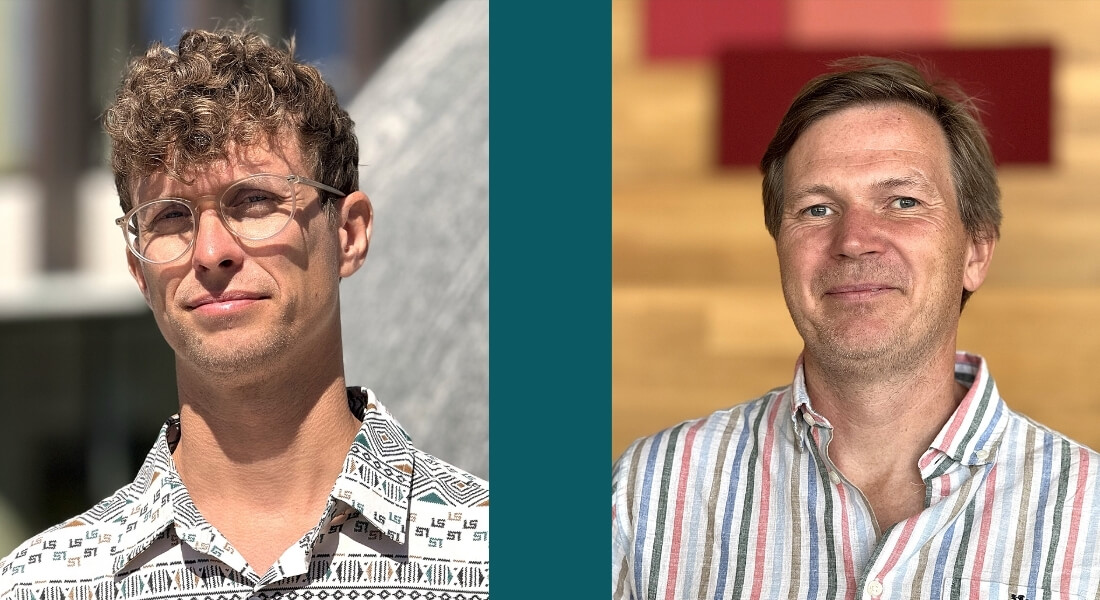NIVI Research Center welcomes first two researchers from Statens Serum Institut
Rasmus Mortensen, head of TB Vaccine Research, and Gabriel Pedersen, head of Adjuvant Research at SSI are joining NIVI Research Center in the work with understanding and tailoring mucosal immune response and improved vaccines for Tuberculosis (TB) and other infectious respiratory diseases.

Rasmus Mortensen and Gabriel Pedersen join NIVI Research Center as affiliated group leaders – and as the first researchers from Statens Serum Institut (SSI) to officially join the growing cross-institutional collaboration.
The partnership has the aim of creating synergy by bringing together experts, experience, and facilities to work towards NIVI’s aim: To revolutionize and accelerate vaccine development in Denmark by bridging the gap between academic research and industry innovation.
Rasmus Mortensen heads SSI’s TB Vaccine Research, focusing on enhancing and accelerating immune responses in the lungs, particularly for tuberculosis. The airways consist of delicate tissues, and vaccine-induced mucosal immunity often fades quickly, as seen with the COVID-19 vaccines.
In the NIVI Research Center-funded project, the group will explore three key areas: 1) How to harness the power of Th17 cells to effectively combat mucosal pathogens without inducing pathology. 2) How lymph node-like architecture, called tertiary lymphoid structures, in the lungs may provide long-lasting local immunity and memory. 3) Define the signals that guide immune cells to the airways in animal studies and human samples from ongoing and future clinical trials of a TB vaccine candidate from SSI. The goal is to support optimized vaccine regimens for classical intramuscular delivery as well as developing a new airway-administered TB vaccine candidate.
Gabriel Pedersen leads the Vaccine Adjuvant Research at SSI. Adjuvants are components in vaccines that stimulate the immune system in various ways. Through 30 years of adjuvant research, SSI has developed several adjuvants, all with the prefix CAF, using cationic liposomes, which are positively charged lipid particles.
These particles can be loaded with different components to tailor the immune response depending on whether the vaccine is to protect against TB, influenza, or another disease.
The NIVI Research Center-supported projects investigate 1) Whether vaccines administered via nasal spray can stimulate local immunity in the airways and 2) Whether immune responses in the airways can be stimulated by adding various components to vaccines administered via intramuscular injection.
"I have always been interested in mucosal immunity and fascinated by the fact that you can stimulate a completely different immune response if you administer vaccines in the nose instead of the muscles. But why isn't this utilized better? Can't we make vaccines that also block transmission? Part of my personal motivation for joining NIVI-R is that these are precisely the same fundamental ideas behind the initiative," says Gabriel Pedersen.
SSI has decades of experience within vaccine research and development in a translational perspective. It has the only Danish BSL-3 (Bio safety level 3) animal facility which is necessary, when working with airborne infections such as TB and highly pathogenic influenza.
NIVI Research Center is an integral part of the Novo Nordisk Foundation Initiative for Vaccines and Immunity (NIVI) and is anchored in Department of Immunology and Microbiology at University of Copenhagen – with its equally highly competitive facilities and expertise within vaccine- and immunology research. The partnership with SSI brings together leading research environments to better understand immune responses, develop the next generation of vaccines, and enhance preparedness for future disease threats.
“We are happy to join forces with UCPH, so we can learn from each other and build a stronger research environment that take advantage of the diverse expertise. NIVI's mission aligns 1:1 with my research interests and the way we have worked for the past 10 years. Now we are increasing the critical mass, which allows for extra sparring and learning across groups working with different pathogens, which is really exciting," says Rasmus Mortensen.
